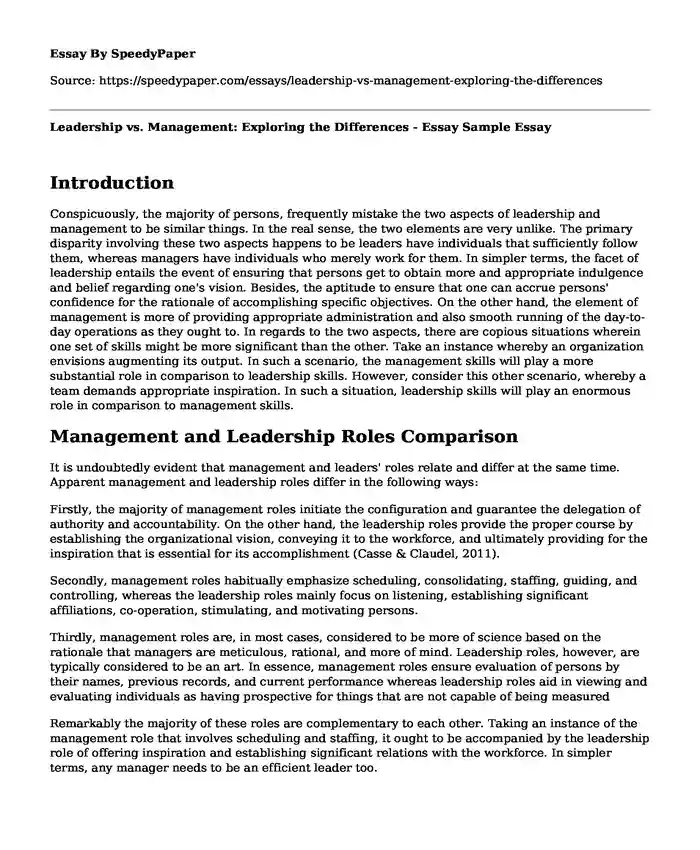
| Type of paper: | Essay |
| Categories: | Leadership analysis Management |
| Pages: | 3 |
| Wordcount: | 589 words |
Introduction
Conspicuously, the majority of persons, frequently mistake the two aspects of leadership and management to be similar things. In the real sense, the two elements are very unlike. The primary disparity involving these two aspects happens to be leaders have individuals that sufficiently follow them, whereas managers have individuals who merely work for them. In simpler terms, the facet of leadership entails the event of ensuring that persons get to obtain more and appropriate indulgence and belief regarding one's vision. Besides, the aptitude to ensure that one can accrue persons' confidence for the rationale of accomplishing specific objectives. On the other hand, the element of management is more of providing appropriate administration and also smooth running of the day-to-day operations as they ought to. In regards to the two aspects, there are copious situations wherein one set of skills might be more significant than the other. Take an instance whereby an organization envisions augmenting its output. In such a scenario, the management skills will play a more substantial role in comparison to leadership skills. However, consider this other scenario, whereby a team demands appropriate inspiration. In such a situation, leadership skills will play an enormous role in comparison to management skills.
Management and Leadership Roles Comparison
It is undoubtedly evident that management and leaders' roles relate and differ at the same time. Apparent management and leadership roles differ in the following ways:
Firstly, the majority of management roles initiate the configuration and guarantee the delegation of authority and accountability. On the other hand, the leadership roles provide the proper course by establishing the organizational vision, conveying it to the workforce, and ultimately providing for the inspiration that is essential for its accomplishment (Casse & Claudel, 2011).
Secondly, management roles habitually emphasize scheduling, consolidating, staffing, guiding, and controlling, whereas the leadership roles mainly focus on listening, establishing significant affiliations, co-operation, stimulating, and motivating persons.
Thirdly, management roles are, in most cases, considered to be more of science based on the rationale that managers are meticulous, rational, and more of mind. Leadership roles, however, are typically considered to be an art. In essence, management roles ensure evaluation of persons by their names, previous records, and current performance whereas leadership roles aid in viewing and evaluating individuals as having prospective for things that are not capable of being measured
Remarkably the majority of these roles are complementary to each other. Taking an instance of the management role that involves scheduling and staffing, it ought to be accompanied by the leadership role of offering inspiration and establishing significant relations with the workforce. In simpler terms, any manager needs to be an efficient leader too.
Directly-Experienced Management Situation
After I had completed my high school education, I happened to have a substantial opportunity of joining a renowned non-governmental organization. In that particular organization, the human resource department was headed by a manager who happened to be a lady by the name Ms. Scarlett. Scarlett had an assortment of leadership attributes that contributed to the effectiveness in the majority of operations she undertook. She had the aptitudes to communicate the organization’s vision and mission to the employees effectively, motivate the employees, and significantly establish an imperative affiliation with every employee. Fundamentally, these attributes contributed to her effectiveness in that nearly all employees would pay attention and undertake the tasks assigned to them appropriately. Besides, concerning the imperative affiliations, Scarlett would be able to identify the well-being of each individual.
References
Casse, P., & Claudel, P. (2011). Leadership styles: A powerful model. Training Journal, 1(2), 46-51. http://www.skolkovo.ru/public/media/documents/pressroom/SKOLKOVO_-_Pierre_CASSE_-_Leadership_styles_a_powerful_model.pdf
Cite this page
Leadership vs. Management: Exploring the Differences - Essay Sample. (2023, Aug 17). Retrieved from https://speedypaper.com/essays/leadership-vs-management-exploring-the-differences
Request Removal
If you are the original author of this essay and no longer wish to have it published on the SpeedyPaper website, please click below to request its removal:
- Business Essay Sample: Project Planning Phase
- Project Management Essay: Scope Compliance and Ethics
- Leadership Essay Sample about Michelle Obama
- Essay Sample on Analysis of Jonathan Edwards' Sermon
- Free Essay: Training Leaders to Have Effective Leadership
- Free Essay Example - The Costco Craze
- The Effectiveness of Consulting Services Provided - Paper Example
Popular categories




